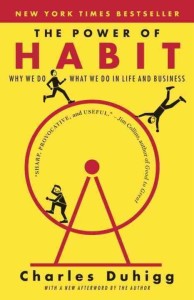
Charles Duhigg’s The Power of Habit is a short, yet powerful book that examines the fundamentals of habit formation and asserts that habits are the core of daily behavior. For decades, habit formation and habit modification have mesmerized psychologists and neurologists alike. The author himself gained a keen interest in habits while reporting in Iraq when he realized U.S. forces used habit formation to control social unrest.
Duhigg argues against society’s hegemonic belief that habits are hard to break by asserting that habits, like any other daily behavior, are easy to create, break, or change. Via research studies and anecdotes, Duhigg shows that our daily activities, including rigorous schedules, are not the products of “well-considered decision making”, but the result of effortless, repetitive, deeply ingrained motions.
The author’s zeal is demonstrated through his in-depth look at habit formation. Duhigg begins the book with the story of Lisa Allen, a divorcee who alters her habits to quite smoking. The author also shares the stories of Eugene Pauly, a survivor of a life-threatening virus who lost a great deal of his memory but retained an astonishing amount of his old habits; and Angie Bachmann, a stay-at-home mother who develops an unhealthy and destructive gambling habit.
The author makes several valid points in this informative book, but he could possibly be underestimating the tight grasp habits have over human beings. Duhigg fails to tackle the issue of why habits can be hard to break and instead asserts that if the fundamentals of habits are learned, then anyone can break a habit. His claim about habit breaking may be true, but Duhigg doesn’t do enough convincing that it is.
The author reveals interesting correlations between the neurological mechanics of the brain and mundane, every day behavior. He highlights the research findings of a doctor who asserts that “real neurological differences impact how pathological gamblers process information”, thus claiming that gambler Angie Bachmann’s unhealthy gambling addiction was fueled by a faulty brain processing. Readers will certainly be intrigued, or even shocked, by learning how heavily habit affects daily functions, including the possibility that habits, at times, override common sense. Readers will learn, too, that good habits can replace bad habits and that habits can be used to reduce stress and improve the quality of one’s health and life.
Even if you do not agree with Duhigg’s heavy claims about habit breaking, The Power of Habit is still definitely worthwhile for the average reader.
Tahirah Blanding is a blogger and freelance writer from North Carolina.
